7A Unit4语法及练习
- 格式:doc
- 大小:51.50 KB
- 文档页数:5
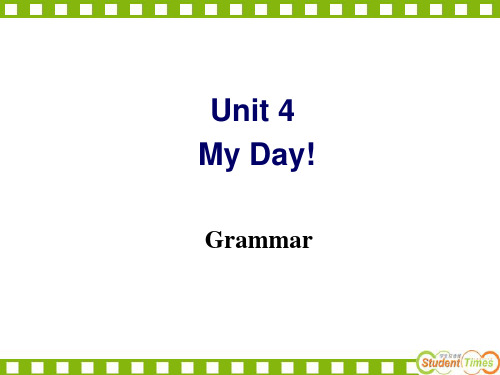

7A Unit 4Grammar 语法专练一(一)介词in介词in 用于表示年,季节,月份, 周或者泛指上午,下午和晚上之前。
1.____ winter2.____ December, 2003 4.____ the morning 5. ____ the afternoon6.____ the evening7.____ March8.____ the first week of this term(二) 介词on介词on用于表示具体的某一天或具体某天的上午,下午,晚上或夜里。
1.____ the first day of March2.____ Monday afternoon3.____ Sunday4.____ the evening of the 4th5.____ Christmas Eve6.____ October 31st(三) 介词at介词at 用于表示某一时刻,如黎明, 午夜, 点与分, 年龄, 周末及就餐时间等。
1.____noon2._____ midnight3._____ 16/ _____the age of 164._____ seven o’clock5. _____ lunchtime6._____ the weekend7. _____ Christmas注意: 如果星期名称前含有next, last, every, this等词时一般不再用介词。
(1).___ next Monday (2).___ last Sunday (3).___ every Tuesday (4).___ this Wednesday一、适当介词填空。
1. We don’t go to school_______ Sunday.2. My birthday is _______ April 1st.3. We’re going to see the doctor_______ four o’clock.4. He was born ________ 1992.5. He often takes Eddie for a walk _____ the evening.6. It’s cold ______ winter in China.7. They have a long holiday______ November. 8. Birds fly to the south _____ autumn.9. He likes reading newspapers_____ breakfast. 10. I don’t have a party ____ this week.11. She starts learning English_____ 6 o’clock. 12. We’ll have one party ___ next week.13.They play the game________ the evening of 31st October.14. He got home _____ the morning of the 4th last month.15. My father usually goes fishing ____ the weekend.16. It is a good idea to go for a walk ____ a sunny morning.17. He always goes to the library ____ Mondays. 18. Children are very happy____ Halloween.19. The story happened _____ a cold winter morning.20. My friends give me some presents _____ Christmas every year.二、单项选择。
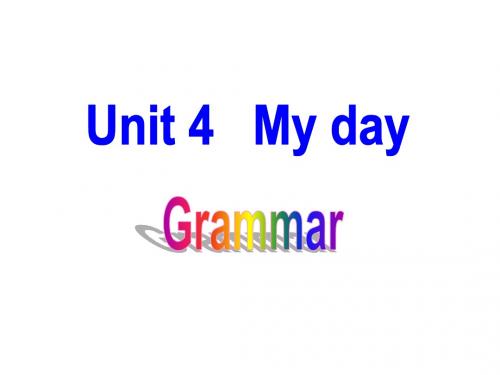
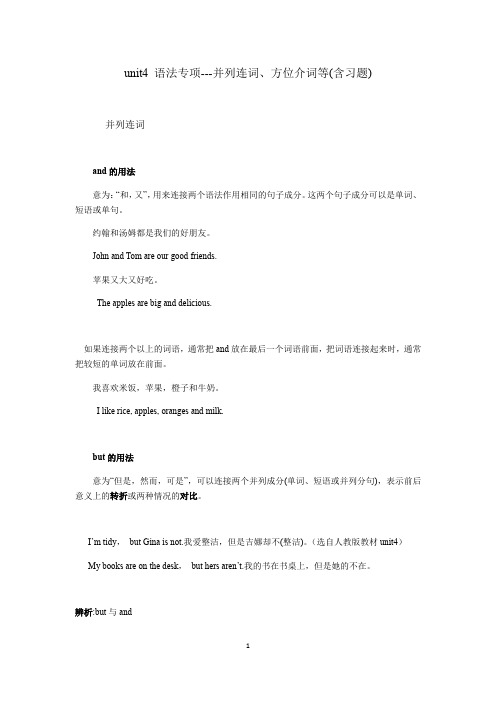
unit4 语法专项---并列连词、方位介词等(含习题)并列连词and的用法意为:“和,又”,用来连接两个语法作用相同的句子成分。
这两个句子成分可以是单词、短语或单句。
约翰和汤姆都是我们的好朋友。
John and Tom are our good friends.苹果又大又好吃。
The apples are big and delicious.如果连接两个以上的词语,通常把and放在最后一个词语前面,把词语连接起来时,通常把较短的单词放在前面。
我喜欢米饭,苹果,橙子和牛奶。
I like rice, apples, oranges and milk.but的用法意为“但是,然而,可是”,可以连接两个并列成分(单词、短语或并列分句),表示前后意义上的转折或两种情况的对比。
I’m tidy,but Gina is not.我爱整洁,但是吉娜却不(整洁)。
(选自人教版教材unit4)My books are on the desk,but hers aren’t.我的书在书桌上,但是她的不在。
辨析:but与and方位介词用法:常用于名词或代词前构成介词短语,用以表示主语所处的位置、地点等结构:方位介词(in/on/ under)+定冠词the或形容词性物主代词等+名词。
意义:on 意思是“在...上面”,通常指一个人或物在另一个物体的表面上,两者之间有接触面。
on the wal在墙上on the floor在(室内)地板上你的书在桌子上Your book is on the table.Where are my books?我的书在哪里?They’re on the sofa.它们在沙发上(选自人教版教材unit4)in表示“在……中;在……里面”,指在某个空间的内部。
在三班in Class3在教室in the classroomWhere’s my pencil box?我的铅笔盒在哪里?It’s in your schoolbag.它在你的书包里。
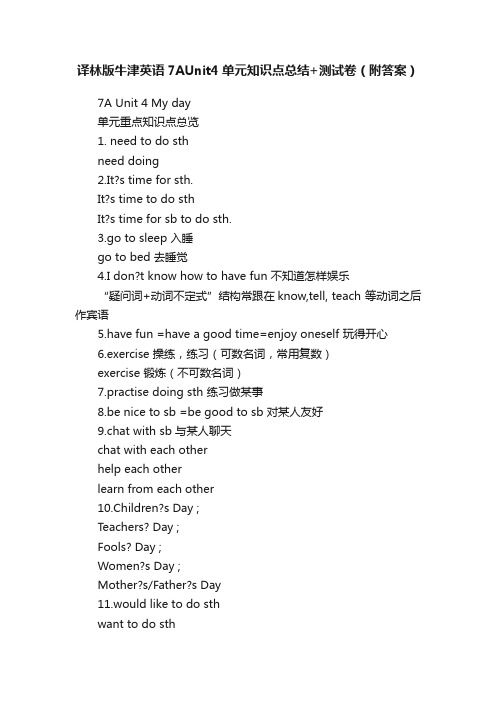
译林版牛津英语7AUnit4单元知识点总结+测试卷(附答案)7A Unit 4 My day单元重点知识点总览1. need to do sthneed doing2.It?s time for sth.It?s time to do sthIt?s time for sb to do sth.3.go to sleep 入睡go to bed 去睡觉4.I don?t know how to have fun 不知道怎样娱乐“疑问词+动词不定式”结构常跟在know,tell, teach 等动词之后作宾语5.have fun =have a good time=enjoy oneself 玩得开心6.exercise 操练,练习(可数名词,常用复数)exercise 锻炼(不可数名词)7.practise doing sth 练习做某事8.be nice to sb =be good to sb 对某人友好9.chat with sb 与某人聊天chat with each otherhelp each otherlearn from each other10.Children?s Day ;Teachers? Day ;Fools? Day ;Women?s Day ;Mother?s/Father?s Day11.would like to do sthwant to do sth12.have (much) time to do sth 有时间做某事a long time 很长时间all the time 一直at the same time 同时in time 及时on time 准时from time to time 有时13.dancing /swimming/singing/reading lessons14.good luck with sth 祝在某方面好运good luck to sb 祝某人好远15.have a picnic=go for a picnic 去野餐16.between 和among的区别between .....and ......between +名词的复数17.How often /how soon/how long/how far的区别18.the reason for (doing)sth19.learn from sb 向某人学习learn to do sth 学做某事learn about 了解,获悉20.in the world 在世界上all over the world 全世界travel around the world 环游世界21.be good for 对.....有好处反义be bad forbe good to 对.... 友好be good at 擅长22.too much/too many/much too的区别23.put up 张贴;举起;提出(建议)put down 写下put on 穿上;上映put away 把....收起来put out 扑灭put off 推迟24.want sb (not) to do sth. 想要某人(不)做某事语法1.时间介词:in/at/on2.频度副词的用法:never,seldom,sometimes,often,usually,always单元重点短语归纳1.wake up 醒来2.go out 出去;熄灭3.how to have fun 如何得到乐趣4.do morning exercises 做早操5.do after-school activities 做课外活动6.be late for 迟到7.be nice to sb对某人很好8.chat with each other相互聊天9.best wishes 最好的祝福10.at age 6 在6岁时11.once a year 一年一次12.plant trees 植树13.a member of ......的成员14.have a good time 玩得开心15.be good for 对.....有好处句型归纳1.My favourite lesson is English. 我最喜欢的课是英语2.We practise after school on Wednesday afternoon. 我们在周三下午放学后练习3.Amy is a member of the swimming team. Amy是游泳队的一员4.They have lots of fun on Children?s Day. 他们在儿童节玩得很开心5.I can learn a lot about the world . 我能学到很多关于世界方面的知识7A Unit4单元测试(A)卷一.短语翻译(每题1分,共10分)1.玩得愉快2.做早操3.在八点一刻4.在操场上5.一切顺利6. at work7.be good for 8.a member of9.write to sb. 10.start lessons二.单项选择(每题1分,共15分)( ) 1. The teacher says we shouldn?t read comic booksA. much tooB. too muchC. many tooD. too many ( ) 2. his father, David Beckham playing football.A. Like,; likesB. Likes; likeC. Like; likeD. Likes; likes ( ) 3. We have to do every day.A. lots of homeworkB.lots of homeworksC. lot of homeworkD. a lots of homeworks( ) 4. Her parents from Shanghai.A. are allB. all areC. both allD. are both ( ) 5.----Open the door please.I?m home.----Come in,please.The door .A. opensB. is openingC. is openD. opened ( ) 6. My bike is broken. Can I a bike you?A. borrow; toB. borrow; fromC. lend; fromD. lend; to ( ) 7. Please have breakfast in morning. It?s good for you.A. the, aB. a, theC. /, /D. /, the ( ) 8. are in Class 12, Grade 7. in the same classA. Jimmy, I and you; We?reB. I, you and Jimmy; They?reC. Jimmy, you and I; They?reD. you, Jimmy and I; We?re( ) 9. I hope the volleyball match. I our team good luck.A. us to win, wishB. we will win, wishC. we to win, hopeD.we will win, hope( ) 10.------Do you every day?------Yes, good for our eyes.A. do eye exercise, it?sB. do eye exercises, they?reC. do eyes exercise, it?sD. do eyes exercises, they?re ( ) 11.Danie?s grandmother is very old. She can?t him well.A. listenB. listen toC. hearD. hear to ( ) 12. I?m going to Nanjing Monday morning.A. atB. inC. onD. of( ) 13. Lily playing football because she is not good at it.A. likeB. lovesC. dislikeD. dislikes ( ) 14. They always do activities .A. after-school; after schoolB. after-school; after-schoolC. after school; after schoolD. after school; after-school( ) 15.I like to TV, but my father likes to books.A. watch; readB. watch; lookC.watch; seeD. read; look at 三.完型填空(每题1分,共10分)Dear Annie,Thank you 1 your letter. I?m glad you like your school.I go to school from Monday 2 Friday. We 3 four classes in the morning and two classes in the afternoon. We have many things4 after class. On Monday and Wednesday afternoon we have5 .On Tuesday afternoon some of6 have a7 class and onThursday afternoon some have a drawing class. On Friday afternoon, we practice 8 English. My Chinese friends would like 9 with me in English. They think I am like an English teacher. Isn?t it great?On Saturdays and Sundays I 10 go to school. Very often I go to the parks and have a good time with my family there.Yours,Henry ( ) 1.A.to B.of C.for D.with( ) 2.A.to B.on C.for D.with( ) 3.A.has B.having C.have D.had( ) 4.A.doing B.does C.do D.to do( ) 5.A.sport B.sports C.some sport D.a sport ( ) 6.A.we /doc/51e483be7e21af45b207a87f.html C.them D.they( ) 7.A.sing B.sings C.singing D.sang( ) 8.A.speak B.to speak C.speaks D.speaking ( ) 9.A.to talk B.talk C.talks D.talking ( )10.A.don?t B.doesn?t C.not D.can?t四.阅读理解(每题2分,共30分)AMr Smith is a teacher of English. He comes from America. He teaches English in China. He speaks Chinese quite well.He reads a lot of books and his wife often writes books for the students at home. Mr Smith gets up at five in the morning. He leaves home at ten to six. He begins the first lesson at 8:00. He teaches English every day except Saturday and Sunday. At ten to twelve he finishes his lessons. Ten minutes later he has lunch. In the afternoon, he often plays games with his students. Sometimes he teaches his students in his office. Supper time is at about six. After that, he reads newspapers and watches TV. At about ten to eleven he goes to bed.( ) 1. Mr.Smith is .A.a ChineseB.an EnglishmanC.a workerD.an American ( ) 2. He leaves home at .A.6:10B.5:50C.7:10D.6:50( ) 3. He doesn't have any English classes on .A.SaturdayB.SundayC.FridayD.Saturday and Sunday( ) 4. He has lunch at .A.12:30B.12:00C.13:30D.13:00( ) 5. He watches TV or reads newspaper supper.A.beforeB.afterC.atD.inBMay 10th is Meg?s birthday. She gets a gift. It is a new coat from her sister. The coat is very beautiful and she feels very happy.One day,Meg finds that a button(纽扣)of her coat is lost. She looks for the button everywhere,but she can’t find it.The next day,she doesn?t wear that coat to school and feel sad all day.After school, she goes to the clothes shops and wants to buy that kind of clothes.But she feels disappointed.Meg tells her sister about that,her sister says,“We can change all the buttons.Then the buttons will be the same.”The coat is beautiful again and Meg feels happy again. ( ) 6.Meg?s sister buys for her on her birthday.A.some buttonsB.a new coatB.C.a new bike D.some flowers( ) 7.How does Meg feel when she doesn?t wear that coat?A.She feels happy.B.She feels bored.C.She feels excited.D.She feels sad.( ) 8.What does Meg?s sister do at the end of the story?A.She changes all the buttons of the coat.B.She buys another coat again.C.She buys a button in the clothes store.D.She goes to the clothes store and changes the coat.( ) 9.What does the underline word “disappointed” mean in Chinese?A.兴奋的B.失望的C.难过的D.高兴的( ) 10.What?s the best title for the passage?A.A lost buttonB.A lost coatC.A kind sisterD.A clothes storeCMy daughter Eyen is ten years old. She is in Grade Three in a primary school. She is a cute girl though she has some strange ideas sometimes.One day she asks me, “Mum, what is your favorite subject?”I think for a while and answer, “ It is difficult to tell. I love singing, so music is my favorite. And I am good at English. My history teacher also s ays I am excellent. Well, I can say I don?t like Science. But Science is important for us, you know. So you must do well in it. What is your favorite subject, Eyen? Tell me something about your subjects, dear.”I like Chinese. It is easy. I like English because my English teacher likes me very much. I can?t stand Maths. It is serious and sad.”“Do you mean your Maths teacher is serious and sad?”“No, it is Maths, not the Maths teacher.”“Why do you think so?”“Because Maths has so many problems! Isn?t it sad all day?”( ) 11. Eyen is ______ years old. She is a ________.A. ten; middle school studentB. nine; middle school studentC. nine; primary school studentD. ten; primary school student( ) 12. The mother doesn?t like ______ thoug h it is important.A.musicB. MathsC. EnglishD. Science ( ) 13. The girl thinks _____ is serious and sad.A.Her Maths teacherB. MathsC. her Chinese teacherD. Chinese ( ) 14. Why doesn?t the girl like Maths?A.Because it is too easyB. Because it is difficult to learnC.Because there aren?t many problems in it.D. Because her teacher doesn?t like her at al l.( ) 15.Which subject does Eyen like?A.Chinese and MathsB. Chinese and EnglishC. English and MathsD.music and English五.任务型阅读(每题1分,共10分)Hi! I am Mike. I have a sister and two brothers. We live in a happy family. Nancy is my sister. She is the oldest. She is a kind girl. She is beautiful. She likes learning. She studies very hard. She gets up early and finishes hr breakfast quickly. Then she goes to school by bike. David is my brother. He is older than me. But he is a little lazy. He gets up late and then washes his face, brushes his teeth in a hurry. Then he goes to the bus stop without breakfast. He usually plays basketball after school. In the evening, he seldom does homework. He goes to bed late. Jack is our little brother. He is a lovely boy. He gets up very slowly and then he usually takes a shower before breakfast. He goes to school in his father?s car. He likes watching TV in the evening.Name Nancy David Jack Personality(个性) She is 1 . He is a little lazy. He is 2 .How to go to school?She 3 to school. He goes to school by4 .He takes a 5 toschool.Habit She finishes herbreakfast 6 He 7 have breakfast. He usually takes ashower 8 breakfast.9 She likes studying. He likes playing10 . He likes watching TV.1.__________2.__________3.__________4._________5.__________6.__________7.__________8.__________9.__________ 10.__________ 六.用所给单词适当形式填空(每题1分,共15分)1.Yao Ming and Lin Shuhao are both basketball (play).2.What about (go) on a picnic next Sunday?3.He enjoys (listen) to music.4.I have many different (kind) of books.5.This is our (one) English lesson.6.We have lots of (activity) after school every day.7.Some children don?t know how (have) fun.8.My mother goes to the supermarket (two) a week.9.Please tell me about your (like) and dislikes.10.Thank you for (buy) me a new pen.11.Let?s help Jack (do) Chinese exercise.12.We should practice (speak) English more.13.Sometimes Jim with his parents (eat) dinner at Shanghai Restaurant.14.Which do you like (good), apples, oranges or pears?15.Lucy, (wake) up, it?s too late.七.首字母填空(每题1分,共10分)Today more and more students are getting shorter sleeping time.Most students sleeps for fewer than(少于) eight h 1 every night, as(因为) they have m 2 homework to do. Some homework is given by the school teachers, and some is from their p 3 . Also, some students don?t know how to save(节约) the t 4 . They aren?t careful enough when they are d 5 their homework, so it t 6 them lots of time. Some students have to get up e 7 to read English in the morning. Some want to get to school on time, b 8 their homes are far away from the school.We hope t 9 and parents should cut down(减少) on the homework, so that children can have more free time to e 10 their childhood(童年).7A Unit4单元测试(A)卷参考答案一.短语翻译(每题1分,共10分)1.have fun2.do morning exercises3.at a quarter past eight4.in the playground5.all the best6.在上班7. 对........有好处8..........的一员9.给某人写信10.开始上课二.单项选择(每题1分,共15分)1-5DAADC 6-10BDDBB 11-15CCDAA三.完型填空(每题1分,共10分)1-5 CACDB 6-10 BCDAA四.阅读理解(每题2分,共30分)1-5 DBDBB 6-10 BDABA 11-15 DDBBB五.任务型阅读(每题1分,共10分)1.kind2.lovely3.rides4.bus5.car6.quickly7.doesn?t8.before9.Hobbies 10.basketball六.所给词适当形式填空(每题1分,共15分)1.players2.going3.listening4.kinds5.first6.activities7.to have8.twice9.likes 10.buying11.do 12.speaking 13.eats 14.best 15.wake 七.首字母填空(每题1分,共10分)1.hours2.much3.parents4.time5.doing6.takes7.early8.but9.teachers 10.enjoy7A Unit4单元测试(B)卷一、短语翻译(每题1分,共10分)1.have fun __________________2.做课外活动____________3.at a quarter past nine ________4.做早操________________5.chat with each other __________6. be late for school ________7.tell you about my life __________ 8. 在校足球队____________9.once a month _______________ 10.从周一到周五_________二、单项选择(每题1分,共15分)( )1.(2014襄阳)-_____does your father allow you to surf the Internet?- Only once a week.A. How farB.How longC.How oftenD.How much ( )2.(2014河南)-Where shall we eat tonight?- Let?s call Harry.He ___ knows the best places to go .A.onlyB. nearlyC.seldomD.always( )3.(2014抚顺)- We?ll have a school trip to Fuzh ou City Museum next week.- ____.And I?m sure you?ll learn a lot.A.Have funB. Cheer upC. Best wishesD. Never mind ( )4.(2013孝感)-Why are you so tired these days?-Well, I have _____ homework to do.A.too muchB.too manyC.much tooD.many too( )5.(2013重庆)-_____ does your father play tennis after work?- Every Tuesday and Thursday.A.How oftenB.How soonC. WhereD. Why( )6.(2013上海) Wow! Ten students in our class will celebrate their fourteenth birthdays _____ October!A.onB.inC.atD.to( )7.(2013北京)Lucy lived in Beijing from 2008 ____ 2012.A.onB.atC.toD.of( )8.(2013菏泽)The World Health Organization has given some advice on ____to protect us from being infected(感染)with H7N9.A.whereB.whatC.howD.when( )9.(2013北京)-Which do you prefer, tea _____coffee?-Tea,please.A.butB.orC.soD.and( )10.(2014济南)-Would you like ____ Emily and Carol?-Of course. I hear they are twins and play the piano well .A.metB.meetsC.to meetD.meet( )11.We can see a playground _____ the two tall buildings.A.betweenB.amongC.inD./( )12.Peter and I______ students. We _____ reading newspapers.A.are both,both likeB.are both,like bothC.both are,both likeD.both are,like both( )13.I often ____ from school with my friend Millie.A.go back to homeB.goes back homeC.goes back to homeD.go back home( )14.-How long do you spend _____ homework every day? - Twenty minutes.A.doB.to doC.doingD.does( )15.-Who ____ in the morning every day?- Nobody.A.wake you upB.wake up youC.wakes you upD.wakes up you三、完形填空(每题1分,共10分)The Spring Festival is the Chinese__1___. It usually comes in January or February. Everyone in China_2___ the Spring Festival very much. When the Spring Festival _3____, Simon usually helps his parents____4___ their house and do some shopping and other__5____. ___6__ that day, everyone in China eats dumplings, New Year?s cakes and some_7____ delicious food. Simon likes New Year?s cakes, but Sandy says dumplings are __8____ than New Year?s cakes. The Chinese people eat New Year?s cakes and dumplings __9___ their houses.__10___ happy they are!( ) 1. A. New Year?s Day B. Teachers? DayC. Children?s DayD. Mid-autumn Day( ) 2. A. thanks B. calls C. looks D. likes( ) 3. A. goes B. comes C. takes D. celebrates ( ) 4. A. want B. get C. come D. clean ( ) 5. A. housework B. families C. homework D. shopping ( ) 6. A. In B. At C. On D. For( ) 7. A. another B. other C. others D. the other ( ) 8. A. tired B. better C. nice D. the nicest ( ) 9. A. in B. at C. with D. outside ( ) 10.A. WhatB. What aC. How aD. How四、阅读理解(每题2分,共30分)ALisa goes to school on foot every day. One morning, Lisa leaves home after breakfast without an umbrella. Then it begins to rain. The rain becomes heavier and he avier. Lisa?s mother worries about her daughter and decides to find Lisa to give her an umbrella. She drives along the way her daughter always walks. She looks left and right through the car windows to look for Lisa. Finally, she finds Lisa walking in the street happily. She also finds that every time lightning strikes, Lisa will stop, look up at the sky and smile. Lisa?s mother is very surprised. She shouts to Lisa, “Lisa, what are you doing?” She answers, “God is taking photos of me, so I smile!”( ) 1. How is the weather according to the passage?A. HotB. WarmC. RainyD. Cold( ) 2. Does Lisa go to school with an umbrella?A. Yes, she is.B. No, she isn?tC. Yes, she doesD. No, she doesn?t ( ) 3. How does Lisa?s mother go to send Lisa an umbrella?A.On footB. By bikeC. By carD. By bus( ) 4. Which is Not true according to the passage?A. Lisa is afraid of the lightning.B. Lisa enjoys the rainingC..Lisa is lovely.D..Lisa?s mother cares for her daughter.( ) 5. Which is the best title for the passage?A bad day B. An umbrella C. Smile D. A great motherBOn Christmas Eve, the night before Christmas Day, children are very happy. They put their stockings at the end of their beds before they go to bed. They want Father Christmas to give some presents. Father Christmas is a very kind man. He comes on Christmas Eve. He lands on top of each house and comes down the chimney into the fireplace and brings children a lot of presents.Christmas Day always begins before breakfast. Children wake up very early. They can?t wait to open the presents in their stockings. Then they wake up their parents and shou t … Merry Christmas!?Do you know what Christmas means? Christmas Day is the birthday of Jesus Christ. When Christ was born, many people gave him presents. So today, people still do the same thing to the children.( ) 6. Christmas Eve is__________.A. the night before 24 DecemberB. the night after 25 DecemberC. the night of 24 DecemberD. the night of 25 December( ) 7. Father Christmas often puts the presents________.A. into children?s hatsB. into children?s stockingsC. under children?s bedsD. into children?s shoes( ) 8. Father Christmas comes into the house through the_______.A. windowB. front doorC. chimneyD. back door( ) 9. On the morning of Christmas Day, children say?_____? to their parents.A. Good morningB. Happy New YearC. Best Wishes to youD. Merry Christmas( ) 10. On Christmas Day, what do people often do to children?A.Give presentsB. Ask for moneyC. ask for presentsD. Give noneCJohn is a middle school student. He is sixteen years old now. One day he had a terrible cold and a fever. He felt bad and couldn't eat anything. So he went to see a doctor. The doctor gave him a bottle of medicine. These are the words on the bottle of the medicine.Cold medicineYou must shake(摇晃) it before you take it. Take it three times a day after meals. Dose (剂量):Age: over 15 2 teaspoons(茶匙) a day8-14 1 teaspoon a day5-7 1/2 teaspoon a dayThe children under 4 years old can't take this medicine.。
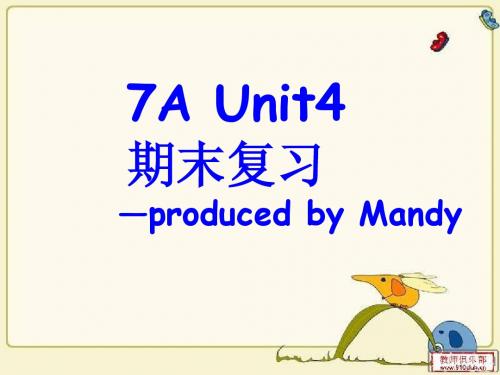
译林牛津版新教材资源重点短语和句子--7A Unit41.wake up 醒来2.wake me up 把我叫醒3.go walking 去散步4.watch too much TV 看太多的电视5.be late for school 上学迟到6.start lessons 开始上课7.do after-school activities 做课外活动8.It’s time for sth /to do sth该干某事了9.I’m never late for school. 我上学从来不迟到10.I don’t know how t o have fun. 我不知道怎样享乐11.need a good rest 需要好好休息12.have lessons/have classes 上课13.have too much homework 有太多的作业14.learn a lot about the world 多了解世界15.dislike doing 不喜欢做某事16.do morning exercises 做早操17.do eye exercises 做眼保健操18.do / take (some) exercise 做运动,做锻炼(不可数) 19.do an English exercise 做一个英语练习(可数)20.be nice to sb = be friendly to sb 对某人友好21.chat with each other 互相聊天22.at a quarter past eight 在八点一刻23.on Wednesday afternoon 在周三下午24.best wishes 最美好的祝愿25.practice playing volleyball 训练打排球26.from to 从...到…27.get ready for the day 为一天做好准备28.plant trees 植树29.in January/February/March/April/May/June/July/August/September/October/November/December在月份30.in the morning/after/evening 在上午、下午、晚上31.on the morning/after/evening of ………在某一个上午、下午、晚上32.help us do sth. / help sb. to do sth. 帮助某人做某事33.on a cold night 在一个寒冷的夜晚34.on the night of July 1st 在七月一日的夜晚35.at noon/night 在中午\夜晚36.on Saturday 在周六37.on Children’s Day在儿童节38.in Spring/Summer/Autumn/Winter 在春天39.in 1999 在1999年40.at 6 years old = at 6 在6岁的时候41.have lots of fun (doing) 玩得很开心42.thanks for your emails 谢谢你的电子邮件43.have a football match 举行一场比赛44.tell sb about sth. 告诉你关于我的生活45.have much time to do 有许多时间做某事46.go to dancing lessons 去上舞蹈课47.go roller skating 去溜旱冰48.get there/home 到那、到家49.once a week 每周一次50.between A and B 在……和……之间51.hope to do sth. 希望做某事52.hope + (that) 跟that宾语从句(从句中含will或can)希望某人做某事53.wish our team good luck 祝我们的球队好运54.wish sb good luck 祝某人好运55.good luck to sb with sth 做某人某事好运56.visit the museum 参观博物馆57.twice a month 一个月两次58.go on a picnic 去野炊59.be good for us 对某人有益60.too much (修饰不可数) / too many(修饰可数)太多1、。
牛津英语沪教版7A,Unit4知识归纳课题:七年级上Unit4知识梳理与巩固教学目标:1 词汇:company ,removal ,meeting ,hurt ,broken ,carrytake notes ,knock down ,catch fire ,both …and …,run away ,fire engine2 语法:一般现在时(职业的表达及常用句型);一般过去时;see sb doing 看见某人正在做…教学重点、难点:1 . Words and vocabulary2. 一般过去时3. 辨析:see sb doing 和see sb do教学过程:一词汇梳理1. meeting ['mi:ti?] n. 会议【词性转换】 meet [mi:t] v. 遇见;会见;见到Mr White isn’t here; he’s at a meeting. 怀特先生不在这儿,他在开会2. manager ['m?nid??] n. 经理【词性转换】manage ['m?nid?] v. 管理;经营management ['m?nid?m?nt] n. 管理;管理学Our manager is very strict with us. 我们的经理对我们要求很严格。
3. take notes 记笔记Please take notes of the important words while you read.请边读边把重要的单词记下来。
4. knock down 撞倒She was knocked down by a bus. 她被公共汽车撞倒了。
5 catch fire 着火His house caught fire last night. 昨晚他家失火了。
6. both...and... ……两者都【提示】 both...and...连接的两个成分须在形式、时态、词性等方面完全一致。
教学内容:7A Unit4、5知识点及语法重点(现在完成时)教学重点:三种时态的训练和巩固教学难点:现在完成时—瞬间动词与延续性动词的转换教学过程:1、课文知识点讲解2、时态练习3、练习巩固4、家庭作业1. 用there be句型表示客观存在(就近原则)2.现在完成时(一)含义现在完成时用来表示现在之前已发生或完成的动作或状态,但其结果却和现在有联系, 也就是说, 动作或状态发生在过去但它的影响现在还存在。
e.g. I have lost my wallet. (含义是:现在我没有钱花了。
)Jane has laid the table.(含义是:已可以吃饭了。
)Michael has been ill.(含义是:现在仍然很虚弱。
)He has returned from abroad. (含义是:现在已在此地)(二)结构助动词have /has+动词过去分词,主语为第三人称单数用has,其他人称用have 。
(三)句型1、肯定句:主语+have /has+动词过去分词+其他。
I have studied English for 5 years .2、否定句:主语+have /has+not +动词过去分词+其他。
We haven’t been there .3、一般疑问句:Have/Has+主语+动词过去分词+其他?Has he eaten that apple ?4、特殊疑问句:特殊疑问词+ have /has +主语+动词过去分词+其他?(四)用法1、现在完成时可以用来表示发生在过去某一时刻的、持续到现在的情况,常与for, since连用。
e.g. Mary has been ill for three days.I have lived here since 1998.2、现在完成时往往同表示不确定的过去时间状语连用, 如already, yet, just, before, recently, lately等:e.g. He has already obtained a scholarship.I haven’t seen much of him re cently (lately).We have seen that film before.Have they found the missing child yet?3、现在完成时常常与表示频度的时间状语连用e.g. Have you ever been to Beijing?I have never heard Bunny say anything against her.I have used this pen only three times. It is still good.George has met that gentleman on several occasions.4、现在完成时还往往可以同包括现在时间在内的时间状语连用,如now, up to these few days/weeks/months/years, this morning/week/month/year, now, just, today, up to present, so far等。
一.必备重点句子:1.我能帮你什么吗?What ?/ Can ?2.我想给我女儿买些衣服。
I want some clothes my .3.我能试穿它/他们吗?Can I / ?4.你穿这裙子很漂亮。
The dress very you .5.这双鞋子多少钱?shoes ?6.好的。
我买下他了。
That’s . I’ll .7.你认为这长裤怎么样?How do you the pants? = What do you the pants?8.开玩笑吗?我会考虑的。
you ? I’ll it.9.我只看看。
I’m .10.仍然谢谢你。
Thank you .11.你能帮我买东西吗?两公斤蛋和一些盐。
Could you help me ?Two and .12.就这些吗?你有一些蔬菜吗?Is ? you have vegetables?二.语法:1.问数量多少东西?How many + 可数名词复数How much + 不可数名词对价格进行提问:how much is/are …? ……多少钱?(1)How much is it? 它多少钱?It's 3 yuan .(2)They’re 165 yuan.Eg. 我们需要多少盐?How我们需要多少袋盐?How1)This pink skirt is only 80 yuan.this pink skirt?2)We need some salt. we need?3)They need two bags of salt. of salt they need?4) He needs two bags of salt. (划线提问)______ _____ salt ____ he ____ ? 二.一些:1. 肯定句用some 否定句用any2.一般疑问句用any 表示提出建议、邀请或请求等的疑问句用some。
1). I want some fish. (改为否定句) I ___ _ want ___ _ fish.2).She has some friends here. (改为否定句)She friends here. 四.量词。
7A Unit 4语法及练习:频率副词的用法:never(从不,从来没有), seldom(很少), sometimes(有时候), often(经常), usually (常常), always(总是,一直),表示做事的频度。
频率副词的位置:1)放在实意动词前面:I rarely chat online.(我很少在网上聊天。
)2)放在be动词后面:The English class is usually in the morning。
(英语课通常都在上午。
)3)在助动词之后:He doesn't always get up early.(他不总是早起。
)名词的用法:可数名词:表示的人或事物可以用数来计量,它有单数与复数两种形式。
不可数名词:所表示的事物不能用数来计量。
物质名词与抽象名词一般无法用数目,来统计,都成为不可数名词。
不可数名词前一般不能用冠词a、an来表示数量,没有复数形式。
要表示“一个……”这一概念,就须加a piece of这一类短语。
要注意许多名词在汉语里看来是可数名词,在英语里却不可数。
如:chalk,paper,bread,rice,grass,news等。
2.可数名词的复数:(1)规则变化A.一般情况下加-s:egg—eggs; cake--- cakes;B.以s, x, ch, sh, 结尾的加-es:bus---buses,box---boxes,watch---watches,brush---brushesC.以辅音字母加y结尾的改y为i再加-es:city---cities,country---countriesD.以f,fe结尾的,去掉f或fe,变成v再加-es:knife—knives; wolf—wolvesE. 以O结尾的单词,除了tomato/ potato/ hero在词尾加es外,其他都在词尾加s:Photo—photos;(2)不规则变化A.元音发生变化:man---men,woman---women,foot---feet,tooth---teeth,mouse---miceB.词尾发生变化:child---childrenC.单、复数同形:fish---fish,Japanese---Japanese,Chinese---Chinese,sheep---sheep3.物质名词(不可数名词)量的表示方法(1)用much,a little,a lot of等表示much/ a little/ a lot of water(2)用容器表示a bowl of rice,a glass of water,a cup of tea,a piece of,orange,two glasses of milk,two pieces of paper易混淆的不可数名词小结:news(新闻,消息), information(信息,资料), advice(建议),money(金钱)名词作主语和谓语的一致:1、复数主语须用复数谓语,单数主语须用单数谓语。
e.g. A number of people in the developed cities ______cars of their own.A. hasB. haveC. there isD. there are2、如果名词主语是一个抽象概念,一般都用单数谓语。
e.g. Smoking is bad for your health.3、当主语是and连接的两个名词时,在指一样东西时用单数谓语,若指两样东西时则需用复数主语。
I want bread and milk instead of bread and butter because bread and butter not __ sold well before.A. areB. isC. wereD. was4、如果名词主语后面跟有with, together with, as well as, except这类词引导的短语,谓语仍用单数,因为这种结构多为修饰语。
Mary with her parents TV ___ in the sitting-room at this time yesterday.A. isB. areC. wasD. were5、集体名词作主语的情况:A. 有些集体名词可跟单数谓语,也可跟复数谓语,视作整体时跟单数谓语,着重于所包含的成员时,则可跟复数谓语。
B. 有些集体名词都指复数的人或动物,后面都用复数谓语。
e.g. The police are going to question him. 警察审视他。
C.有些集体名词后面的谓语用单数或复数都可以,也有的集体名词通常只跟单数谓语。
名词练习:一.找出不可数名词,在横线上打勾,并将可数名词变成复数形式:homework ______ half ______ advice______ money ______ knowledge ______ boot _____music ______ chicken ________ mouth ______bread _______information ______milk _____cow _______ orange ________ water ________ 二.选择填空:1.The deer has four ______.A. footB. feetC. feetsD. foots2.Her two brothers are both ______.A. policemanB. policemansC. policemenD. policemens3.There are four _____ and two ______ in the group.A. Japanese, GermenB. Japaneses, GermenC. Japanese, Germans4.Two ______ would come to the village.A. woman-doctorsB. women doctorC. women doctorsD. woman doctors5.Can you see nine _____ in the picture?A. sheepB. dogC. pigD. horse6.The _____ has two ______.A. boys, watchesB. boy, watchC. boy, watchesD. boys, watch7.The boy often brushes his _____ before he goes to bed.A. toothB. toothsC. teethD. teeths8.The Japanese ____ will not leave China until she finishes her study.A. womanB. womenC. manD. men9.There are lots of _____ in the basket on the table.A. tomatosB. tomatoC. tomatoesD. tomatoss10. The cat caught two ______ last night.A. mousesB. miceC. mouseD. mices11. There are some ________ on the hill.A. sheepsB. a sheepC. sheepD. sheepes12. Mr Black often gives us ________ by Email.A. some good informationB. some good informationsC. good informationsD. a good information13. There are some new books in the school library. They are ____ books.A. childB. childrens'C. childrenD. children's14. I have worn out my shoes, so I want to buy a new ________ .A. pairB. oneC. onesD. trousers15. Meimei's handwriting is better than any other ______ in his class.A. studentsB. studentsC. student'sD. students'16. The hospital is a bit far from here. It's about _______ .A. forty minutes's walkB. forty minute's walkC. forty minutes walkD. forty minutes' walk17. How many _____ are there in your class ?A. JapaneseB. AmericanC. AustralianD. Canadian18. I found my black cat in_____ room.A. Jim and MikeB. Jim and Mike'sC. Jim's and Mike'sD. Jim's and Mike19. How much are the _____ ?A. breadB. meats.C. potatosD. tomatoes20. There are many ______ in our school.A. woman teachersB. woman's teachersC. women teachersD. women's teachers21. Three months ________ a long time for me.A. isB. areC. haveD. has22. There are ______ and ______ on the table.A. two boxes cake; four bottle of orangesB. two boxes cake; four bottle of orangeC. two boxes of cakes; four bottles of orangeD. two box of cakes; four bottles of orangesThere be句型:There be句型:表示“某地(或某时)存在有某人(或某物),而并非某地(某人、某物或某时)拥有什么东西”,肯定形式:“There be+代词或名词(短语)+地点/时间状语”。